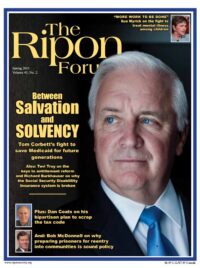
The Ripon Society hosted a Bully Pulpit Policy Conference on Social Security Reform in Washington, DC, on May 26, 2011, a conference that focused not only on the need to address the fiscal challenges facing the Social Security system, but a plan that has been introduced in Congress to do just that.
The Conference featured a panel discussion with three experts on the Social Security program and the need for reform. The panelists included Andrew Biggs of the American Enterprise Institute, David Kendall of Third Way, and Maya MacGuineas of the Committee for a Responsible Budget. The discussion was moderated by Margaret Hostetler, a Professional Staff member on the Ways and Means Subcommittee on Social Security.
The panel discussion was followed by a keynote address by South Carolina Senator Lindsey Graham, who is the author of legislation that would reform Social Security by, among other things, means testing and raising the retirement age of Social Security recipients.
An Opening for Reform
Starting the panel discussion, AEI’s Biggs expressed his view that the government needs to help the public do three things: work more, save more,
and retire later. Some incentives to achieve these goals, he said, include increasing the early retirement age from 62 to 65 and eliminating the payroll tax for anyone 62 and older.
He added that this would not only provide a better incentive for individuals to delay retirement, but also a reason for companies to hire
and retain older workers. While there have been cries on the left that the only way to fix the system is to increase revenue, MacGuineas echoed Biggs’s approach and stated her preference is “to do as much of this as possible on the spending side.”
 “There is such a strong case to bring down benefits aggressively for people at the high end,” MacGuineas stated. “To me, that’s actually the combination…It combines the Republican or conservative preference for keeping spending down and not using taxes to fix this, and it combines the progressive perspective for making the program more progressive … there is such a strong case for making Social Security more progressive through benefit reduction.”
“There is such a strong case to bring down benefits aggressively for people at the high end,” MacGuineas stated. “To me, that’s actually the combination…It combines the Republican or conservative preference for keeping spending down and not using taxes to fix this, and it combines the progressive perspective for making the program more progressive … there is such a strong case for making Social Security more progressive through benefit reduction.”
However, Kendall stressed that some revenue increases would be necessary for Democratic support, noting Third Way’s preference for a 2:1 ratio of spending reduction to revenue increases. While there was a great deal of optimism among the panelists about possible compromises, skepticism for Congress acting on one of these compromises remains. Kendall explained that Republicans need to look towards the left in order to get the public support necessary. “You can get political cover from Democrats,” he stated. “Democrats created Social Security, so we are more trusted to reform it.”
“One party can reform an entitlement program alone if you’re adding benefits. But two parties are necessary to reduce benefits.”
MacGuineas stated that given the divisive political climate, Social Security is the only major program which can be touched. “I do see an opening right now,” she said, noting that neither party has turned Social Security “into the punching bag of this election.” While sharing the optimism of his fellow panelists that the opportunity for reform exists now, Kendall also made sure to keep everything in perspective for Republicans, who he suggested may have been too aggressive with their plan to overhaul Medicare coming off their electoral successes in 2010. Way scholar noted. “But two parties are necessary to reduce benefits.”
Breaking the Status Quo
In his keynote address following the panel discussion, Graham discussed his bill,
The Social Security Solvency and Sustainability Act (S. 804), which he introduced on April 13 with fellow Senators Mike Lee of Utah and Rand Paul of Kentucky.
He also discussed the political realities of passing various reform proposals that have been put forward thus far. For instance, Graham, who played a key role in trying to forge a bipartisan consensus during President Bush’s 2005 attempt to reform Social Security, explained that there are not 60 votes in the Senate for private accounts, which were a core part of the 2005 debate.
Moreover, he noted, the Republican House Majority has stated firmly that they are not willing to raise taxes. “What’s left?” he asked. “Age and formula benefits changes … You can achieve solvency by adjusting the age and doing a means test, but every year you wait, the harder it gets.” Defending these proposed changes, Graham said:
“We’re not being mean. We’re just being responsible.”
“You don’t have to raise taxes to ask upper income Americans to contribute to solvency. You can readjust their benefits…”
In addition to his legislation, Graham also offered some suggestions to make any Social Security reform proposal more palatable for Democrats who feel higher income individuals should contribute more. Once again explaining that raising taxes would be a non-starter for many Republicans, the Senior Senator from South Carolina suggested that higher income individuals could forgo future benefits, calling it “a form of sacrifice.”
“You don’t have to raise taxes to ask upper income Americans to contribute to solvency,” he continued. “You can readjust their benefits … To me, it’s better for the economy, and makes more sense for the individual.”
Graham concluded by noting that Social Security reform of any kind will require strong leadership from both President Obama and Congress.
“The Ronald Reagan-Tip O’Neill model is the only way this can possibly work,” he said, referring to the 1983 Social Security agreement struck between the Republican President and Democratic Speaker.
“It’s going to take Republicans and Democrats — with some support network — breaking the status quo. That’s the formula of the past, that’s the
formula of today, and that’ll be the formula for the future.”
Stephen Jackson is an editorial assistant with The Ripon Forum and special projects director for The Ripon Society.




